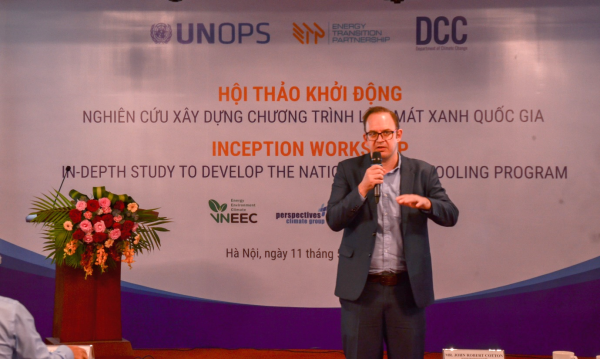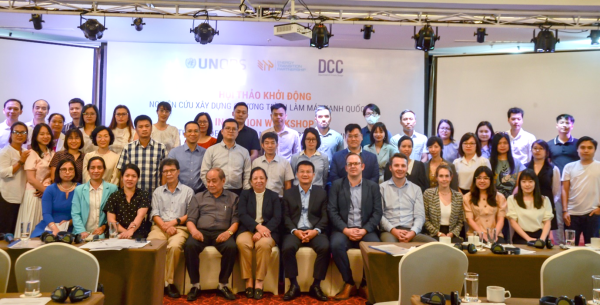On May 11, the Energy and Environment Consulting Joint Stock Company (VNEEC) coordinated with the Department of Climate Change, the Ministry of Natural Resources and Environment, the Southeast Asia Energy Transition Partnership (ETP) and other project implementation partners have successfully organized the Inception Workshop on “In-depth study and survey to develop the National Green Cooling Program”.
According to the data released by the World Bank, it is estimated that Vietnam will lose more than 10 billion USD in 2020, equivalent to 3.2% of GDP due to the impact of climate change of which the cooling industry accounts for 518 million USD. At the same time, the cooling industry is a relatively large source of greenhouse gas (GHG) emissions due to electricity consumption and is also one of the largest emitters of ozone-depleting substances (ODS) into the earth’s atmosphere.
In the opening remark, Mr. Nguyen Tuan Quang, Deputy Director, Department of Climate Change, Ministry of Natural Resources and Environment said “Cooling indirectly contributes to climate change by increasing the demand for electricity (largely still generated from fossil fuels) and through the leakage of ODS, GHG, which have a much higher global warming potential than CO2 emissions. If left uncontrolled, the emissions from cooling are expected to double by 2030 and triple by 2100”.

Mr. John Robert Cotton, Senior Program Manager Southeast Asia Energy Transition Partnership
Mr. John Robert Cotton, Senior Program Manager Southeast Asia Energy Transition Partnership, stressed that the focus of the NGCP is on energy efficiency (EE), hence the program is designed to reduce GHG emissions, and this is a good opportunity for Vietnam to promote the use of renewable energy to achieve net zero emissions target by 2050. Furthermore, a NGCP also benefits Vietnam in other aspects such as employment, welfare, and economic development.
More specifically, the purpose of the project is in-depth research and survey to assess the current status of existing technology, market state and international/national policies for the cooling sector in Vietnam. Male. Since then, a comprehensive National Green Cooling Program has been developed with a roadmap to promote a rapid transition to low-carbon technology, increase energy savings, and gradually phase out ODS and HFCs in the entire industry, contributing towards achieving the goals set in the latest Nationally Determined Contribution (NDC) by 2030.
Therefore, the results of this research activity will provide the necessary data for the Ministry of Natural Resources and Environment to use in the development of the Management Plan for the Phase out of ODS, controlled greenhouse substances submitted to the Prime Minister for consideration and promulgation by the end of 2023.
At the workshop, the Department of Climate Change presented important content related to updating Vietnam’s legal regulations on mitigating GHG emissions and protecting the ozone layer. Next, the Vietnam Standards and Quality Institute, Directorate for Standards, Metrology, and Quality also reviewed regulations and policies related to the energy efficiency of refrigeration and air-conditioning equipment, along with introducing the national standards (TCVN) on energy efficiency in the cooling sector. Following this, the consulting group introduced the Project “In-depth study and survey to develop the National Green Cooling Program” and the implementation plan. The international expert/ leader of the consulting consortium also shared international experiences and made recommendations for Vietnam in this field. At the end of the workshop, the participants also had a lively discussion around the topics of green cooling and gave plenty of useful comments on the project.

Workshop participants
The Inception Workshop successfully attracted the participation of more than 70 businesses, as well as banks, associations, domestic and foreign research institutes/schools, both online and offline. Giving the closing remark, Mr. Nguyen Tuan Quang affirmed that vast anticipation proved that the cooling sector is of great importance in Vietnam’s response to climate change. However, for Vietnam to ensure cooling for people to respond to climate change while reducing emissions from cooling, is a tough task. He also made a number of recommendations focusing on several key aspects. First, it is necessary to review the tasks of the project to avoid overlapping with other cooling related projects. Second, it is vital to have a plan to coordinate with authorities and enterprises to get correct data and close coordination with experts because of the complexity of this field. Third, there should be a detailed work plan with deliverables and timeline as well as effective coordination between partners implementing the project due to the short and demanding timeline to avoid any delay of the project. Finally, it is imperative to accelerate the activities of the project generating the necessary inputs for the National Plan for Management and Phase out of controlled substances by November this year. Time is of the essence and rapid progress is significant in order to meet these goals.
3,470 views, 4

Tags:
Bài viết liên quan